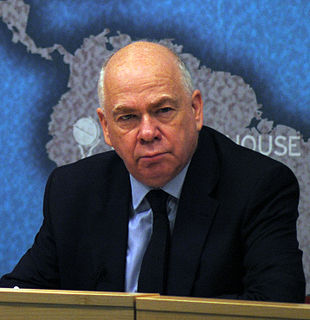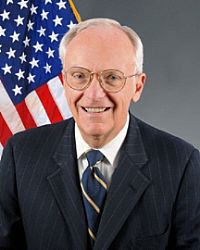Related Research Articles

The Princeton School of Public and International Affairs is a professional public policy school at Princeton University. The school provides an array of comprehensive coursework in the fields of international development, foreign policy, science and technology, and economics and finance through its undergraduate (AB) degrees, graduate Master of Public Affairs (MPA), Master of Public Policy (MPP), and PhD degrees. The school is consistently ranked as one of the best institutions for the study of international relations and public affairs in the country and in the world. Foreign Policy ranks the Princeton School as No. 2 in the world for International Relations at the undergraduate and No. 4 at the graduate level, behind the Edmund A. Walsh School of Foreign Service at Georgetown University.

The Paul H. Nitze School of Advanced International Studies (SAIS) is a graduate school of Johns Hopkins University based in Washington, D.C., United States, with campuses in Bologna, Italy, and Nanjing, China. It is consistently ranked one of the top graduate schools for international relations in the world. The school is devoted to the study of international relations, diplomacy, national security, economics, and public policy. The school has hosted world leaders on a regular basis for public debate in international affairs.

Ashton Baldwin Carter is an American public policy professor who served as the 25th secretary of defense from February 2015 to January 2017. He is currently director of the Belfer Center for Science & International Affairs at Harvard Kennedy School.

The School of International and Public Affairs at Columbia University (SIPA) is the international affairs and public policy school of Columbia University, a private Ivy League university located in Morningside Heights, Manhattan, New York City.

John Gerard Ruggie was the Berthold Beitz Research Professor in Human Rights and International Affairs at Harvard's Kennedy School of Government, and an Affiliated Professor in International Legal Studies at Harvard Law School.

The President's Council of Advisors on Science and Technology (PCAST) is a council, chartered in each administration with a broad mandate to advise the President of the United States on science and technology. The current PCAST was established by Executive Order 13226 on September 30, 2001, by President George W. Bush, was re-chartered by President Obama's April 21, 2010, Executive Order 13539, by President Trump's October 22, 2019, Executive Order 13895, and by President Biden's February 1, 2021, Executive Order 14007.
Mitchel B. Wallerstein is an American educator, philanthropist, policy expert, and former senior official of the federal government of the United States. He is the President Emeritus of Baruch College of the City University of New York and is currently appointed as a University Professor. In 2021, he was also appointed as a Non-resident Senior Fellow on U.S. Foreign Policy at the Chicago Council on Global Affairs. From 2003 to 2010, Wallerstein served as dean of the Maxwell School of Citizenship and Public Affairs at Syracuse University, which is ranked as the nation's leading school of public and international affairs.

Martin Meyerson was an American city planner and academic leader best known for serving as the President of the University of Pennsylvania (Penn) from 1970 to 1981. Meyerson, through his research, mentorship, essays and consulting, exerted formative influence on U.S. postwar urban policy at the municipal and federal levels.

John Alexander Gordon was an American air force general who served as Deputy Director of the Central Intelligence Agency. He also served as the President's Homeland Security advisor from 2003 to 2004.

Sir Lawrence David Freedman, is a British academic, historian and author with specialisms in foreign policy, international relations and strategy. He has been described as the "dean of British strategic studies" and was a member of the Iraq Inquiry. He is an Emeritus Professor of War Studies at King's College London.

Frank Graham Klotz served as Under Secretary of Energy for Nuclear Security and Administrator for the National Nuclear Security Administration of the U.S. Department of Energy. He was confirmed for the position on April 8, 2014, and retired on January 20, 2018.

Earl Anthony Wayne is an American diplomat. Formerly Assistant Secretary of State for Economic and Business Affairs, Ambassador to Argentina and Deputy Ambassador to Afghanistan, Wayne served nearly four years as Ambassador to Mexico. He was nominated by President Obama and confirmed by the Senate in August, 2011. He departed Mexico City for Washington July 31, 2015 and retired from the State Department on September 30, 2015. Wayne attained the highest rank in the U.S. diplomatic service: Career Ambassador. He is currently a Diplomat in Residence at American University's School of International Service and works with the Woodrow Wilson International Center for Scholars, the Atlantic Council, the Center for Strategic and International Studies, and as an independent consultant, speaker and writer. Wayne worked as an adviser for HSBC Latin America on improving management of financial crime risk from 2015 until 2019 and with the American Foreign Service Association from 2017 to 2019.

Douglas Alan Brook is visiting professor of public policy in the Sanford School of Public Policy at Duke University. He was United States Assistant Secretary of the Army from 1990 to 1992 and Assistant Secretary of the Navy from 2007 to 2009.
The Assistant Secretary of Defense for Global Strategic Affairs, or ASD(GSA), is a position in the Office of the Secretary of Defense that develops policy for the Secretary on countering weapons of mass destruction, nuclear forces and missile defense, cyber security and space issues. ASD(GSA) is currently tasked with three major congressionally mandated reviews: the Nuclear Posture Review, the Ballistic Missile Defense Review, and the Space Posture Review. In addition, GSA is the Defense Department's lead in developing the DoD's cybersecurity strategy, and for crafting the policy for the standup of the new Cyber Command. ASD(GSA) answers to the Under Secretary of Defense for Policy. Although ASD(GSA) is a recently configured office, its functional responsibilities can be traced back in part to a position eliminated in early 2008, the 'Assistant Secretary of Defense for International Security Policy
Stephen D. Biddle is an American author, historian, policy analyst and columnist whose work concentrates on U.S. foreign policy. Currently, he is the Professor of International and Public Affairs at School of International and Public Affairs, Columbia University. He received recognition for his 2004 book Military Power: Explaining Victory and Defeat in Modern Battle, published through Princeton University Press. He also has worked in groups under Generals Stanley McChrystal and David Petraeus forming U.S. counter-insurgency policy.
William Robert Van Cleave was a former advisor to President Ronald Reagan, the United States Department of Defense, and Department of State as well as Emeritus Professor, former head, and the founder of Missouri State University's Department of Defense and Strategic Studies (DSS). The DSS program is now located in Fairfax, VA, 10 miles from Washington D.C. He was also advisory council member of the Center for Security Policy, board advisor of the American Center for Democracy and National Institute for Public Policy. As a strategic thinker, he is remembered as a leading Cold Warrior and long-standing hawkish policy advocate.

James M. Goldgeier is a professor of international relations at the School of International Service at American University in Washington, D.C., where he served as dean from 2011 to 2017. He became dean in August 2011. Previously he was employed at George Washington University in Washington, D.C., as professor of political science and international affairs (2004–2011), associate professor of political science and international affairs (1998–2004), and assistant professor of political science and international affairs (1994–1998). While at George Washington University, he also served as director of the Institute for European, Russian and Eurasian Studies (2001–2005), for which he had previously served as acting director (1999–2000). Before joining George Washington University, he taught at Cornell University (1991–1993).

Elizabeth D. Sherwood-Randall is an American government official who serves as the 11th homeland security advisor for U.S. President Joe Biden.
David M. Van Slyke is an American educator and policy expert on Public Administration, Contracting, and Nonprofit Organization. He is Dean of the Maxwell School of Citizenship and Public Affairs at Syracuse University, which is ranked among the nation's leading school of public and international affairs. He has taught at Syracuse University since 2004 and is an expert on public-private partnerships, public sector contracting and contract management, and policy implementation. He previously served on the faculty at Andrew Young School of Policy Studies at Georgia State University from 1999-2004
References
- 1 2 "Biographical and Financial Information Requested of Nominees". Nominations Before the Senate Armed Services Committee, First Session, 111th Congress (PDF). Washington, D.C.: U.S. Government Printing Office. 2010. pp. 553–555. Retrieved May 26, 2021.
- 1 2 "Michael Nacht". California Council on Science and Technology . Retrieved October 12, 2013.
- 1 2 "Michael Nacht: Assistant Secretary of Defense for Global Strategic Affairs". United States Department of Defense . Retrieved October 12, 2013.
- ↑ "Michael Nacht". The Washington Post . July 24, 2012. Archived from the original on November 1, 2013. Retrieved October 12, 2013.